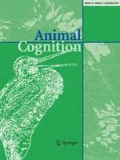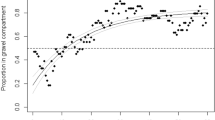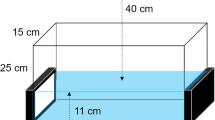Abstract
Theory and empirical findings predict that individuals in a negative affective state are more sensitive to unexpected reward loss and less sensitive to unexpected reward gain compared to individuals in a neutral or positive affective state. We explore the use of sensitivity to reward shifts measured during successive contrast tasks as an indicator of affect in zebrafish (Danio rerio). In line with the assumption that exposure to rewarding stimuli induces a relatively positive affective state compared to exposure to stimuli that they do not prefer, we confirmed that zebrafish prefer enriched over barren environments, suggesting that the enriched environment is associated with positive affective states. We trained individuals to swim down a channel for food rewards of differing value and then presented them with unexpected increases or decreases in reward value. Contrary to our hypothesis, individuals conditioned to a high-value reward continued swimming at the same speed when reward value was downshifted, thus showing no successive negative contrast effect and appearing insensitive to reward loss. Individuals whose rewards were upshifted gradually increased their speed, but did not display successive positive contrast effects typical of sensitivity to reward gains. In both cases, housing type did not result in differences in swim time. One potential explanation is that goal-directed control of behaviour is necessary for an animal to show a successive contrast response to unexpected reward gain or loss, and the behaviour of zebrafish in this task was under habitual control, perhaps due to over-training. If so, refinements to task design and training procedures will allow further progress with this assay.







Similar content being viewed by others
Data availability statement
The data sets generated during and/or analysed during the current study are available from the corresponding author on reasonable request.
References
Amsel A (1992) Frustration theory. Cambridge University Press, New York
Amsterdam A, Hopkins N (2006) Mutagenesis strategies in zebrafish for identifying genes involved in development and disease. Trends Genet 22:473–478
Anderson DJ, Adolphs R (2014) A framework for studying emotions across phylogeny. Cell 157:187–200. https://doi.org/10.1016/j.cell.2014.03.003
Baganz D, Siegmund R, Staaks G, Pflugmacher S, Steinberg CEW (2005) Temporal pattern in swimming activity of two fish species (Danio rerio and Leucaspius delineatus) under chemical stress conditions. Biol Rhythm Res 36:263–276
Beck A (1967) Depression: clinical, experimental and theoretical aspects. Harper Row, New York
Benefield R, Oscos A, Ehrenfreund D (1974) Role of frustration in successive positive contrast. J Comp Physiol Psychol 86:648–651
Bentosela M, Jakovcevic A, Elgier AM, Mustaca AE, Papini MR (2009) Incentive contrast in domestic dogs (Canis familiaris). J Comp Psychol 123:125–130
Berghmans S, Jette C, Langenau D, Hsu K, Stewart R, Look T, Kanki JP (2005) Making waves in cancer research: new models in the zebrafish. Biotechniques 39:227–237
Bilotta J, Risner ML, Davis EC, Haggbloom SJ (2005) Assessing appetitive choice discrimination learning in zebrafish. Zebrafish 2:259–268
Bitterman ME (1969) Thorndike and the problem of animal intelligence. Am Psychol 24:444–453
Burman OH, Parker RM, Paul ES, Mendl M (2008) Sensitivity to reward loss as an indicator of animal emotion and welfare. Biol Lett 4:330–333. https://doi.org/10.1098/rsbl.2008.0113
Capaldi EJ, Lynch D (1967) Repeated shifts in reward magnitude: evidence in favor of an associational and absolute (non-contextual) interpretation. J Exp Psychol 75:467–517
Clark L, Watson D (1991) Tripartite model of anxiety and depression: psychometric evidence and taxonomic implications. J Abnorm Psychol 100:316–336
Couvillon PA, Bitterman ME (1985) Effect of experience with a preferred food on consummatory responding for a less preferred food in goldfish. Anim Learn Behav 13:433–438
Creaser CW (1934) The technique of handling the zebrafish (Brachydanio rerio) for the production of eggs which are favourable for embryological research and are available at any specified time throughout the year. Copeia 1934:159–161
Crespi LP (1942) Quantitative variations in incentive and performance in the white rat. Am J Psychol 55:467–517
Dawkins MS (1990) From an animal’s point of view: motivation, fitness and animal welfare. Behav Brain Sci 13:1–61
Dickinson A, Balleine B (1994) Motivational control of goal-directed action. Anim Learn Behav 22:1–18. https://doi.org/10.3758/BF03199951
Dolan RJ, Dayan P (2013) Goals and habits in the brain Neuron 80:312–325
Ehrenfreund D (1971) The effect of drive on successive magnitude shifts in rats. J Comp Physiol Psychol 76:418–423
Engeszer RE, Patterson LB, Rao AA, Parichy DM (2007) Zebrafish in the wild: a review of natural history and new notes from the field. Zebrafish 4:21–40. https://doi.org/10.1089/zeb.2006.9997
Flaherty CF (1996) Incentive relativity. Cambridge University Press, Cambridge
Flaherty CF, Greenwood A, Martin J, Leszczuk M (1998) Relationship of negative contrast to animal models of fear and anxiety. Anim Learn Behav 26:397–407
Fowles D (1994) A motivational theory of psychopathology. In: Spaulding WL (ed) Integrative views of motivation, cognition, and emotion. University of Nebraska Press, Nebraska, pp 181–238
Freidin E, Cuello MI, Kacelnik A (2009) Successive negative contrast in a bird: starlings’ behaviour after unpredictable negative changes in food quality. Anim Behav 77:857–865
Galhardo L, Almeida O, Oliveira RF (2011) Measuring motivation in a cichlid fish: an adaptation of the push-door paradigm. Appl Anim Behav Sci 130:60–70
Gehring WJ, Himle J, Nisenson LG (2000) Action-monitoring dysfunction in obsessive-compulsive disorder. Psychol Sci 11:1–6
Gonzalez RC, Gleitman H, Bitterman ME (1962) Some observations on the depression effect. J Comp Physiol Psychol 55:578–581
Gonzalez RC, Holmes NK, Bitterman ME (1967) Resistance to extinction in the goldfish as a function of frequency and amount of reward. Am J Psychol 80:269–275
Gonzalez RC, Potts A, Pitcoff K, Bitterman ME (1972) Runway performance of goldfish as a function of complete and incomplete reduction in amount of reward. Psychonom Sci 27:305–307
Gonzalez RC, Ferry M, Powers AS (1974) The adjustment of goldfish to reduction of magnitude of reward in massed trials. Anim Learn Behav 2:23–26
Graham C, von Keyserlingk MA, Franks B (2018) Zebrafish welfare: natural history, social motivation and behaviour. Appl Anim Behav Sci 200:13–22. https://doi.org/10.1016/j.applanim.2017.11.005
Grunwald DJ, Eisen JS (2002) Headwaters of the zebrafish—emergence of a new model vertebrate. Nat Rev Genet 3:717–724
Hajcak G, McDonald N, Simons RF (2004) Error-related psychophysiology and negative affect. Brain Cogn 56:189–197. https://doi.org/10.1016/j.bandc.2003.11.001
Hamilton IM, Dill LM (2002) Monopolization of food by zebrafish (Danio rerio) increases in risky habitats. Can J Zool 80:2164–2169
Harding EJ, Paul ES, Mendl M (2004) Cognitive bias and affective state. Nature 427:312
Kerr JP (1963) Grouping behaviour of the zebrafish as influenced by social isolation. Am Zool 2:532–533
Kimmel CB (1989) Genetics and early development of zebrafish. Trends Genet 5:283–288
Kistler C, Hegglin D, Würbel H, König B (2011) Preference for structured environment in zebrafish (Danio rerio) and checker barbs (Puntius oligolepis). Appl Anim Behav Sci 135:318–327. https://doi.org/10.1016/j.applanim.2011.10.014
Kobre KR, Lipsitt LP (1972) A negative contrast effect in newborns. J Exp Child Psychol 14:81–91
Larson ET, O’Malley DM, Melloni RHJ (2006) Aggression and vasotocin are associated with dominant-subordinate relationships in zebrafish. Behav Brain Res 167:94–102
LeDoux JE (2017) Semantics, surplus meaning, and the science of fear. Trends Cogn Sci 21:303–306. https://doi.org/10.1016/j.tics.2017.02.004
Leppänen J (2006) Emotional information processing in mood disorders: a review of behavioral and neuroimaging findings. Curr Opin Psychiatry 19:34–39
Lowes G, Bitterman ME (1967) Reward and learning in the goldfish. Science 157:455–457
Mackintosh NJ (1971) Reward and aftereffects of reward in the learning of goldfish. J Comp Physiol Psychol 76:225–232
Maxwell FR, Calef RS, Murray DW, Shepart FC, Norville RA (1976) Positive and negative contrast following multiple shifts in reward magnitude under high drive and immediate reinforcement. Anim Learn Behav 4:480–484
McClure MM, McIntyre PB, McCune AR (2006) Notes on the natural diet and habitat of eight danionin fishes, including the zebrafish Danio rerio. J Fish Biol 69:553–570. https://doi.org/10.1111/j.1095-8649.2006.01125.x
Mellgren RL (1971) Positive contrast in the rat as a function of number of preshift trials in the runway. J Comp Physiol Psychol 77:329–333
Mellgren RL (1972) Positive and negative contrast effects using delayed reinforcement. Learn Motiv 3:185–193
Mendl MT, Paul ES (2016) Bee happy: bumblebees show decision-making that reflects emotion-like states. Science 353:1499–1500. https://doi.org/10.1126/science.aai9375
Mendl M, Burman OHP, Parker RMA, Paul ES (2009) Cognitive bias as an indicator of animal emotion and welfare: emerging evidence and underlying mechanisms. Appl Anim Behav Sci 118:161–181
Morales A, Torres MC, Megías JL, Cándido A, Maldonado A (1992) Effect of diazepam on successive negative contrast in one-way avoidance learning. Pharmacol Biochem Behav 43:153–157
Mustaca AE, Bentosela M, Papini MR (2000) Consummatory successive negative contrast in mice. Learn Motiv 31:272–282
Muzio RN, Segura ET, Papini MR (1992) Effect of schedule and magnitude of reinforcement on instrumental learning in the toad, Bufo arenarum. Learn Motiv 23:406–429
Naranjo C, Tremblay L, Busto U (2001) The role of the brain reward system in depression. Prog Neuropsychopharmacol Biol Psychiatry 25:781–823
Papini MR (1997) Role of reinforcement in spaced-trial operant learning in pigeons (Columba livia). J Comp Psychol 111:275–285
Papini MR, Ishida M (1994) Role of magnitude of reinforcement in spaced-trial instrumental learning in turtles (Geoclemys reevesii). Q J Exp Psychol 47B:1–13
Papini MR, Mustaca AE, Bitterman ME (1988) Successive negative contrast in the consummatory responding of didelphid marsupials. Anim Learn Behav 16:53–57
Papini MR, Muzio RN, Segura ET (1995) Instrumental learning in toads (Bufo arenarum): reinforcer magnitude and the medial pallium. Brain Behav Evol 46:61–71. https://doi.org/10.1159/000113259
Plaut I (2000) Effects of fin size on swimming performance, swimming behaviour and routine activity of zebrafish Danio rerio. J Exp Biol 203:813–820
Reed B, Jennings M (2010) Guidance on the housing and care of zebrafish, Danio rerio. RSPCA UK, West Sussex
Rolls ET (2005) Emotion Explained. Oxford University Press, New York
Rolls ET (2006) Brain mechanisms of emotion and decision-making. Int Congr Ser 1291:3–13
Rubenstein AL (2003) Zebrafish: from disease modelling to drug discovery. Curr Opin Drug Discov Dev 6:218–223
Rubenstein AL (2006) Zebrafish assays for drug toxicity screening. Expert Opin Drug Metab Toxicol 2:231–240
Shanab ME, Sanders R, Premack D (1969) Positive contrast in the runway obtained with delay of reward. Science 164:724–725
Spence R, Gerlach G, Lawrence C, Smith C (2008) The behaviour and ecology of the zebrafish, Danio rerio. Biol Rev 83:13–34
Thorndike E (1911) Animal intelligence: experimental studies. MacMillan, New York
Wenzlaff RM, Grozier SA (1988) Depression and the magnification of failure. J Abnorm Psychol 97:90–93. https://doi.org/10.1037/0021-843X.97.1.90
Zuur AF, Ieno EN, Elphick CS (2010) A protocol for data exploration to avoid common statistical problems. Methods Ecol Evol 1:3–14. https://doi.org/10.1111/j.2041-210X.2009.00001.x
Acknowledgements
We would like to thank John Ahern, Tania Long and Darren Cipolla for assistance with animal husbandry. We also thank Sharon Koh for assistance with data collection. This research work was funded by the Margaret Catto Award and K. Handasyde.
Funding
This research was funded by the Margaret Catto Award and K. Handasyde.
Author information
Authors and Affiliations
Corresponding author
Ethics declarations
Conflict of interest
The authors declare that they have no conflict of interest.
Research involving human participants and/or animal rights
This article does not contain any studies with human participants performed by any of the authors.
Ethical approval
All applicable international, national, and/or institutional guidelines for the care and use of animals were followed. All procedures performed in studies involving animals were in accordance with the ethical standards of the institution or practice at which the studies were conducted (The University of Melbourne, AEC Project 1212695.3).
Additional information
Publisher's Note
Springer Nature remains neutral with regard to jurisdictional claims in published maps and institutional affiliations.
Rights and permissions
About this article
Cite this article
Tan, S.L.T., Handasyde, K.A., Rault, JL. et al. Insensitivity to reward shifts in zebrafish (Danio rerio) and implications for assessing affective states. Anim Cogn 23, 87–100 (2020). https://doi.org/10.1007/s10071-019-01318-6
Received:
Revised:
Accepted:
Published:
Issue Date:
DOI: https://doi.org/10.1007/s10071-019-01318-6




